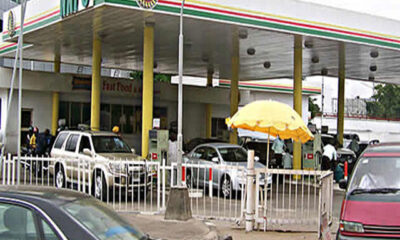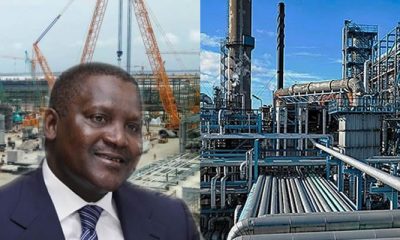Business
FG owes NNPCL N4.56tn for subsidising petrol price – FAAC report
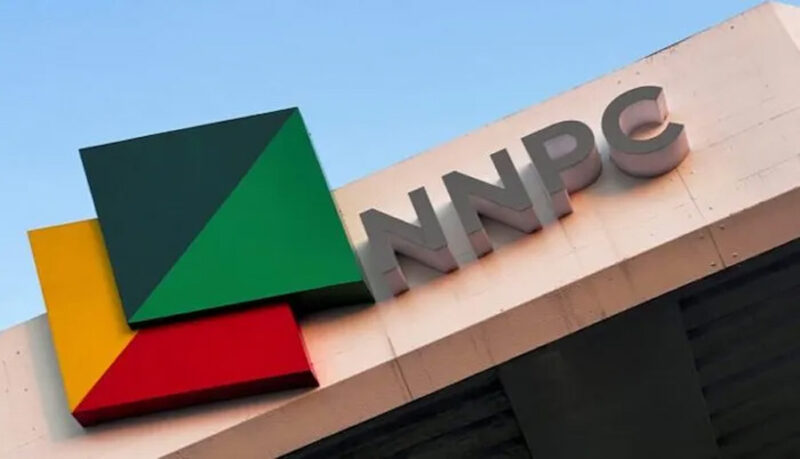
FG owes NNPCL N4.56tn for subsidising petrol price – FAAC report
The Nigerian National Petroleum Company Limited (NNPCL) has informed the Federal Account Allocation Committee (FAAC) of an outstanding of N4.56 trillion for selling petrol at a subsidized price between August 2023 and June 2024.
This is according to documents from FAAC meetings in July and August, which were seen by Nairametrics.
According to a report from a FAAC Post-Mortem Sub-Committee (PMSC) meeting, the outstanding amount is said to be unrecovered funds arising from exchange rate differentials on Premium Motor Spirit (PMS) importation.
The report read: “During the last FAAC Plenary meeting, the Sub-Committee reported that NNPCL claimed that the Federation was owing an unrecovered sum of N4,344,519,176,167.32 as of May, 2024 Federation Account arising from Exchange Rate Differentials. This amount has increased to N4,558,597,379,030.6 as of June, 2024.”
RMAFC asks NNPC for more details
While reconciliation efforts are ongoing to resolve the outstanding balance, the Chairman of the Revenue Mobilization Allocation and Fiscal Commission (RMAFC), who presided over the subcommittee meeting, has formally requested detailed information from NNPCL management.
This information includes the volume of PMS imported, the pricing structure, and sales values, to substantiate the weighted exchange rate applied in the billing.
The report noted: “Accordingly, reconciliation is ongoing; however, the Chairman of the Commission, who chaired the meeting, had written to NNPCL management requesting the volume, price and sales value to justify the weighted exchange rate.”
READ ALSO:
- Chinese investors seized another $57million Nigerian govt private jet in Canada
- Fuel: Marketers load at N780/litre, NNPC says queues will disappear soon
- Police raid bandits’ hideout, foil kidnap attempts in Katsina
Concerned states seek clarification
The NNPCL’s claim raised concerns among the commissioners of finance from various states, prompting a call for further clarity and accountability.
During the meeting, the Commissioner of Finance from Akwa Ibom State sought clarification on the massive debt claimed by NNPCL and inquired about potential resolutions to the financial burden.
The Accountant-General of the Federation (AGF) and a representative from NNPCL responded during the meeting.
A copy of minutes of the meeting seen by Nairametrics read: “Responding, the Accountant-General of the Federation (AGF) recalled that the matter was discussed at the FAAC Technical Session, held earlier in the day and the representative of NNPC Ltd explained that the company had approval to apply the ‘weighted average rate’ on PMS transactions in order to maintain its current price. She stated that the representative of NNPC Ltd also explained that, if the ‘floating rate’ was to be applied, the price of PMS would be higher than the current price.
“In his comment, the representative of NNPC Ltd informed members that there was a Federal Government directive that the ex-depot price of PMS be kept at N524.99 per litre. He explained that for the company to sell at that price, it must have to obtain Forex at N600/$, which was not the case.”
The Commissioner of Finance from Delta State expressed concerns about NNPCL’s decision to source U.S. dollars for transactions, particularly when the crude oil being sold was already denominated in the same currency. He emphasized the need for NNPCL to be more transparent and accountable in its operations.
Also, the Commissioner of Finance from Bayelsa State suggested that NNPCL should operate more independently as a corporate entity. He argued that this would allow the company to manage its transactions without frequent recourse to the Federation Account.
FG owes NNPCL N4.56tn for subsidising petrol price – FAAC report
Business
External reserves at risk over fuel subsidy removal, rising debt servicing – CBN

External reserves at risk over fuel subsidy removal, rising debt servicing – CBN
The Central Bank of Nigeria has said that fuel subsidy removal and increase in debt servicing obligations could pose downside risks for the growth of external reserves by 2024/2025.
The apex bank disclosed this in its Monetary, Credit, Foreign Trade and Exchange Policy guidelines for fiscal years 2024/2025.
However, the CBN in its outlook projected a positive economic output growth in Nigeria by 2024/2025 based on continued policy support in the agriculture and oil sectors, reforms in the foreign exchange market, and the effective implementation of the Finance Act 2023 and the 2022-2025 Medium-Term National Development Plan (MTNDP).
The CBN said, “The outlook for Nigeria’s external sector in 2024/2025 is optimistic, on the expectation of favorable terms of trade, occasioned by sustained rally in crude oil prices and an improvement in domestic crude oil production.
“The positive outlook is supported by the sustenance of crude oil price, propelled by the decision to cut production, and gains from capital flows and remittances.
“However, lower crude oil earnings, fuel subsidy removal, rising import bills, and increased external debt servicing obligations could pose downside risks for the accretion to external reserves.
“In addition, the sustained monetary policy tightening by central banks across advanced economies increases the risk of capital outflow.”
On Nigeria’s output growth, CBN said, “Nigeria’s output growth is expected to maintain a positive trajectory in 2024/2025.
“The growth prospects are dependent on continued policy support in the agriculture and oil sectors, reforms in the foreign exchange market, and the effective implementation of the Finance Act 2023 and the 2022-2025 MTNDP.
“The risk to the outlook is still tilted to the downside, characterized by significant headwinds such as rising energy prices emanating from lingering effects of the Russia-Ukraine war, and the persisting security and infrastructural challenges, which could undermine the growth outlook in the short to medium term.
“Domestic prices are expected to remain elevated through 2024/2025, on the back of spillovers from global supply constraints, and exchange rate pass-through.
“More so, the persisting security and infrastructural challenges could exacerbate inflationary pressures.”
Business
Dangote Refinery hasn’t received full operational licence – NMDPRA
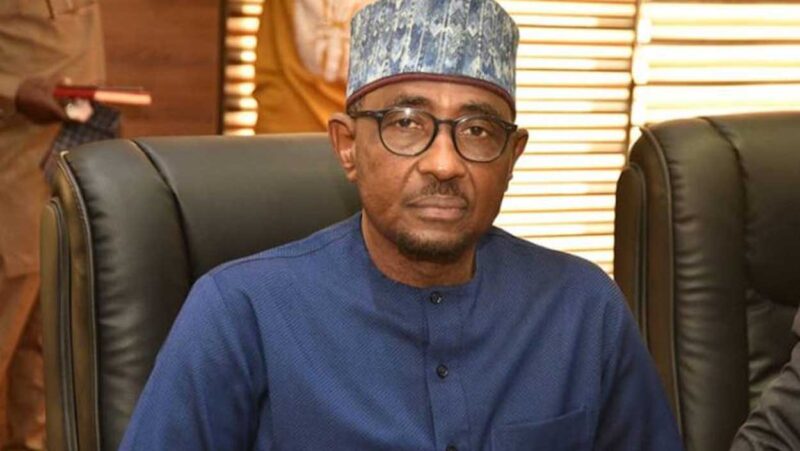
Dangote Refinery hasn’t received full operational licence – NMDPRA
Africa’s largest refinery, the Dangote Petroleum Refinery, has not yet been granted a full operational licence, according to the Nigerian Midstream and Downstream Petroleum Regulatory Authority (NMDPRA).
George Ene-Ita, Head of Public Affairs at NMDPRA, revealed that the refinery, which has a capacity of 650,000 barrels per day, remains in its pre-commissioning phase.
The refinery is undergoing a phased process, with only two out of four priority sections having received approval for the introduction of hydrocarbons.
This update highlights that while the refinery is making progress, it has not yet completed the necessary regulatory steps to commence full operations.
“The entire plant is subdivided into four sections technically referred to as priorities one, two, three, and four.
“At this stage of pre-commissioning, only priorities one and two have been given approval to introduce hydrocarbons, which allows the plant to operate on a test-run basis,” Ene-Ita told The Guardian.
Considering the refinery’s stages of approval, the NMDPRA said the refinery only has permission to produce petroleum products like diesel, jet fuel, and kerosene.
READ ALSO:
- JAMB gives reasons for limiting physical interaction with underaged candidates
- Tension in Kano, Ganduje reportedly plots to dethrone Emir Sanusi again
- I’m a rapist, admits husband who drugged, abused wife for 10 years
According to the regulator, only the approved products are permitted to be released into the Nigerian market under its regulatory supervision.
Ene-Ita said the audits to be undergone by the refinery include tests on the plant’s mechanical, electrical, and instrumentation systems, an action to ensure the refinery’s preparedness for full-scale production.
He added that full production and an increased volume of PMS would only be achieved when approval is given to introduce hydrocarbons into priorities three and four.
He said, “Once these sections are operational, the plant will undergo a 90-day observation period during which additional tests and audits will be carried out to confirm compliance with regulatory guidelines. If, after 90 days, our technical team confirms that the facility adheres to all parameters, the refinery will be issued a License to Operate (LTO), marking its full operational status.”
Ene-Ita also reacted to the concerns over the colour of PMS produced during the pre-commissioning phase.
He explained that the Nigeria Industrial Standards (NIS) specified colour for PMS is Oxblood Red.
He said the refinery is not fully operational, adding that the colour may not conform to NIS standards until it is fully operational.
“It’s important to note that colour is not necessarily an indicator of product quality, nor is it a quality parameter in regulatory compliance. When the Dangote Refinery becomes fully operational, it will be expected to produce PMS that conforms to the NIS colour specifications,” added Ene-Ita.
Dangote Refinery hasn’t received full operational licence – NMDPRA
Business
Dangote refinery to transport 75% of fuel locally by sea

Dangote refinery to transport 75% of fuel locally by sea
Dangote Refinery is set to transport 75% of its local petroleum product supply through sea routes.
Indeed, it said products for Calabar, Port Harcourt, Warri, Apapa and Atlas would mainly move by sea, with road transport reserved for urgent needs.
Vice President of Dangote Industries Limited, Devakumar Edwin, disclosed this in an interview with Arise News.
He said this would ease the pressure on road infrastructure.
This is coming as the refinery began distributing Premium Motor Spirit popularly called petrol on Sunday.
The sea transport option is considered despite the company’s capacity to load 83% of its products by road.
Edwin also said that the shift to sea transportation aimed to reduce the higher costs associated with road distribution.
He said as the largest single-train refinery globally, Dangote Refinery offers both sea and road export options.
He added that the oil firm decided to evacuate nearly all production by sea for strategic reasons.
Edwin said, “We have both exporting facilities by sea and by road. 75% of the production can be evacuated through sea. In fact, now we are ramping up to make it even 100%.
“Anything going to Calabar, Port Harcourt, Warri, Apapa, Atlas can all be taken through the sea. So only what is imminently required by road can be taken.
“But I also have the facility to load 83% of my production through road. We have just built-in flexibility but we can avoid all traffic congestion on the road by evacuating through sea and it will also bring down the cost of transhipment.”
He further noted that most products destined for central Nigeria could be shipped from Port Harcourt and Warri, while those for the East and North-East could be moved from Calabar.
To avoid congestion where Dangote refinery is located, the Lagos State Government has announced that the electronic call-up (e-call-up) system will be activated on the Lekki-Epe corridor from September 23, 2024, after a previously scheduled launch in August was postponed.
-

 metro3 days ago
metro3 days agoFG begins free CNG conversion in three Ogun centres
-
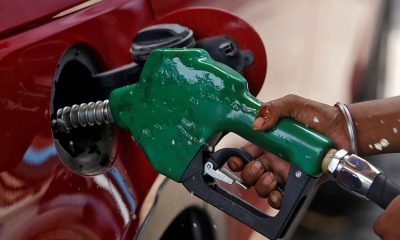
 Business3 days ago
Business3 days agoPetrol: Dangote pump price emerges as NNPC trucks begin loading
-

 Business17 hours ago
Business17 hours agoDangote refinery to transport 75% of fuel locally by sea
-

 News3 days ago
News3 days agoDangote fuel supply forces Scotland refinery to announce shutdown date
-

 Politics3 days ago
Politics3 days agoI never said I’d be VP to anyone in 2027 – Peter Obi
-

 metro8 hours ago
metro8 hours agoFour burnt to death, eight others injured in Ore-Ijebu Ode road crash
-

 metro3 days ago
metro3 days agoMen beware – Lack of sex can make your wife miserable, angry
-

 Aviation3 days ago
Aviation3 days agoAir traffic controllers threaten to ground Nigeria’s airports Wednesday



